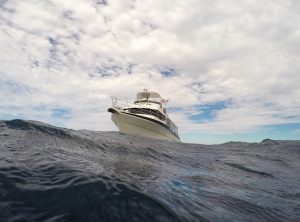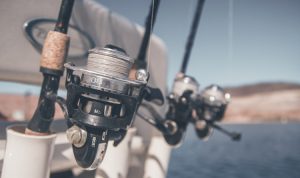Boating Safety
Blog | November 27th, 2019Boating Safety is every water user’s responsibility. We found the following article on www.myboatinglife.com.au and we wanted to share it with you.

Many recreational boaters all too often take calm water conditions for granted.
We should never forget how quickly the weather can change… a glorious, warm summer day can typically transform calm waters to a boisterous whirlpool when an afternoon ‘southerly buster’ roars up the coast, or when a strong wind whips-up a tranquil lake to something akin a washing machine.
BOAT SAFETY ESSENTIALS
As with boat licences, safety regulations can vary between the states and territories, although there are measures every boat owner should take when venturing out on the water…
- Always advise family, friends and relevant marine rescue authorities of your destination and expected return.
- A 27MHz or, preferably, VHF marine radio should always be the primary form of communication when on the water. (Regard your mobile phone only as a back-up communication device.)
- Ensure lifejackets – if not being worn – are easily accessible, not tucked away in hard-to-reach places. (Also ensure everyone onboard knows how to fit their lifejackets.)
- Never overload your vessel. All boats these days are required to carry a label signifying the number of people it is authorised to carry.
- All vessels, if venturing more than two nautical miles offshore, must be equipped with a 406MHz digital Emergency Position Indicating Radio Beacon (EPIRB). (It’s not simply a matter of purchasing a 406MHz EPIRB… you must register it with the Australian Maritime Safety Authority’s (AMSA) Rescue Coordination Centre. Registration requires the EPIRB owner to log the vessel name, type, emergency contact details and other information that will assist ASMA should you ever get into trouble while on the water.)
- Consider joining your local flotilla of Australian Volunteer Coast Guard Association (AVCGA) or similar local authority – it’s a great way of supporting these people who do such sterling work on behalf of boaters.

INFORMATION FOR PARENTS / ADULTS
A lifejacket can keep your child afloat. Drowning can occur in less than a minute, without noise, and often happens when an adult is nearby.
What to look for when choosing a lifejacket:
- The AS 1512 number on the lifejacket means that it meets specific criteria for performance and design according to Australian Standards.
- Check the size and weight on the label. Try the lifejacket on your child. Check for proper fit by lifting the lifejacket at the shoulders. If there is more than 10cm between the child’s shoulders and the lifejacket, it’s too big!
- A head support collar is important for small children. It supports their head when in the water and a loop on the collar allows for grabbing and lifting a child from the water.
- Small children must have a crotch strap that promotes a snug fit. The strap should be used at all times.
- For older children, it’s important to consider comfort and appearance. Let the child help to choose their lifejacket and put their name on it.
- After selection is made, have the child test the lifejacket in a pool. This gives you the chance to observe the fit and performance of the lifejacket in water, and it gives your child a chance to become comfortable with their lifejacket.
- Teach your child to swim on their back while wearing the lifejacket.
YOU’RE THE SKIPPER, YOU’RE RESPONSIBLE
Wherever you are and whatever you’re doing on the water, remember… you’re the skipper, you’re responsible!
If you need your boat trailer serviced or repaired Sales Trailers on (02) 9533 3652
